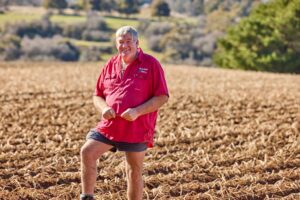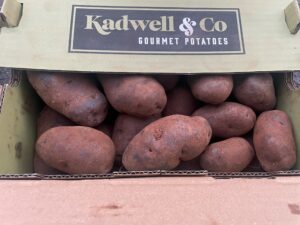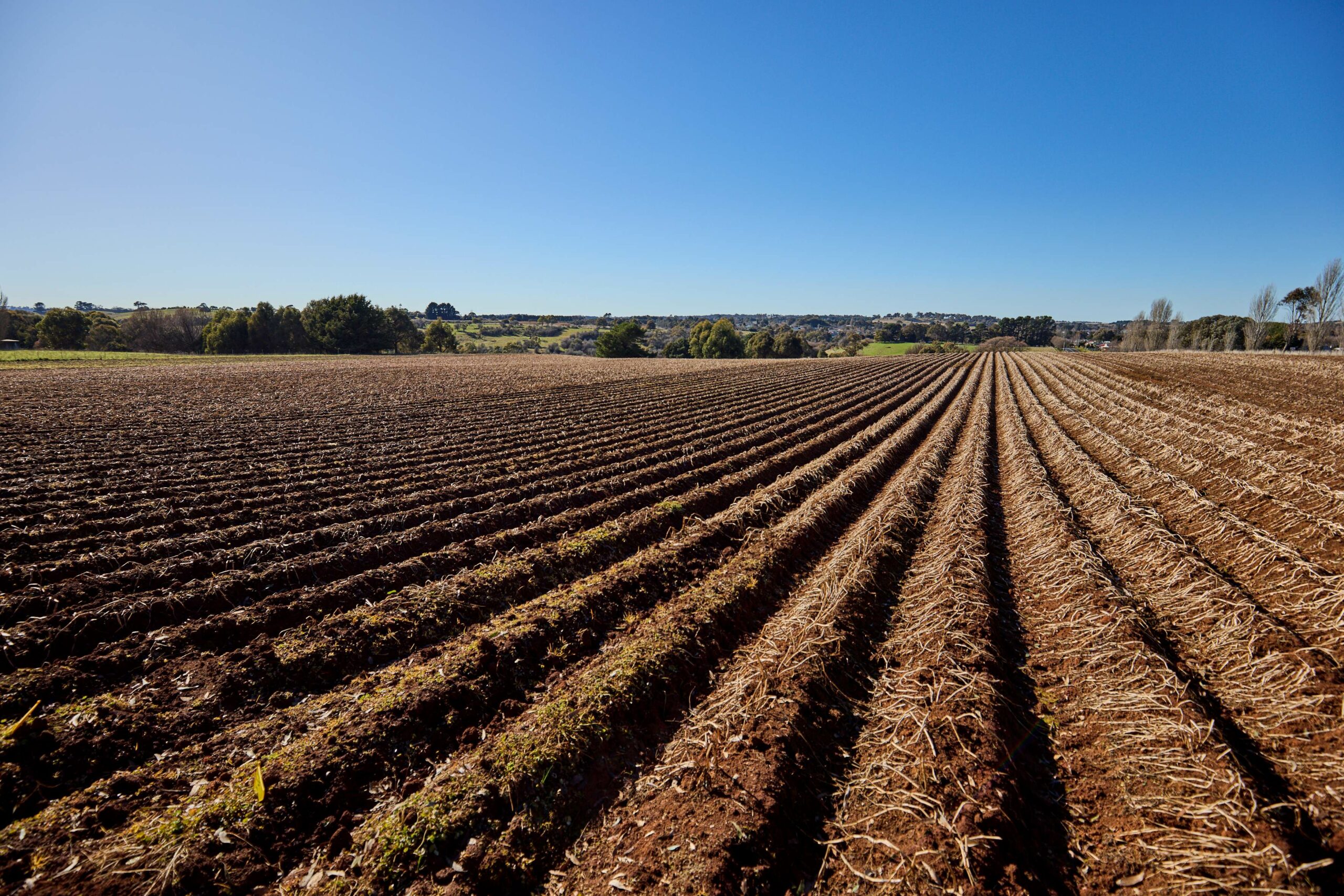Restoring land, production and community
For more than 100 years, the Kadwell family has been growing potatoes in the Crookwell region. Farm revegetation has been integral to the success of the business and to the community.
The Crookwell region of New South Wales is prime potato country and in years gone by supported many small holding growers who supplied ware potatoes into the local co-op. In that mix, was seed potato grower, Garry Kadwell and his family.
The Kadwell family have been in the district for more than 100 years, establishing an orchard and a small market garden for the local community and markets. In the early years, Kennebecs, Sequoia and Sebago were the most popular varieties grown. Sebago K, a robust oval potato was bred by Garry’s father.
In the 1970s, Garry could see that as the apple market changed the family orchard would not be viable long term and replaced it with an expansion to the potato production.
The Crookwell region is highly fertile, with granite through to basalt, with pockets of volcanic soil, giving a pH of 4.1 – 4.2. Water is plentiful with rainfall in the order of 800-900mm a year. Irrigation of crops is a recent addition for farmers in the district and gives an insurance policy to ensure that crops yield well to compete in a tougher market. Typical of volcanic soils, sulphur and magnesium can be low requiring a dressing to ensure the right nutrient balance. The Crookwell district is 1,000m above sea level, so winters give hard frosts and snow, and hot summers.
Over time, those 200 small holding farms have gone, leaving Garry and two other potato growers in the district. Garry’s primary focus remains with certified seed potatoes.
The farm now is around 2,100 acres, with around 160-200 acres used for seed potato production, in rotation with his flock of Hampshire Downs sheep, first cross ewes and pasture. Around 40 per cent of the property is remnant and rehabilitated bushland.

“My grandfather had the foresight to plant trees – I have great memories of planting with him when I was a child,” says Garry.
“I have continued that practice by expanding the amount of bushland we have which puts us in a unique situation where we are isolated from other growers in the area, providing a quarantine zone which is perfect for seed potatoes.”
Each year as part of the seed potato certification process, Garry tests for viruses such as PCN and comes up clean, giving high quality seed potatoes for other growers who supply the fresh and processor markets. Varieties include FL and Atlantic for crisping as well as Maranca.
Seed potato production represents about 90 per cent of the potato production, while ware potatoes account for about 10 per cent.
Garry has also begun the move across to more niche varieties for the hospitality market with Kipfler, Pink Fir Apple and Red Rouge, to give consumers an appreciation of what a potato truly tastes like. Gary readily admits that producing niche varieties does have additional complexities but says that his approach is to farm and harvest more slowly to protect the potato.
In his first year producing niche varieties, Garry took out the delicious Harvey Norman award for Producer of the Year in 2020. He says it has given the humble spud pride of place on consumers’ plates.
The native bushland has provided many additional benefits for the farm including an increase in beneficial insects, reducing the need for insecticides. The bush blocks used for grazing, appeared to be healthy, but on closer inspection, the bush diversity was not as good as it could be. By fencing off those areas, the diversity balance has improved significantly.
The most recent rehabilitation of the property has been the development of a wetland in a natural valley. A chain of ponds in what was once an eroded gorge, now provides habitat for flora and fauna, some of which is listed as endangered. The flow on effect has been greater soil moisture retention. In five short years, Garry has seen a marked improvement in the overall health of the farm.
The return of the farmland to bush has been a carefully thought-out process, with what Garry describes as a wheel and spoke layout. The surrounding bushland forms a ‘hub’ around the property, with ‘spokes’ running through the property to provide connected corridors for wildlife. His work has been acknowledged by Landcare and Soils for Life for his innovative land management and sustainability, recognising his whole-of-farm practice.
“By increasing the native vegetation to around 40 per cent, I have seen the yields go up and inputs down for our potatoes and pasture. The trees provide a source of natural mulch so the soil health has improved. For the lambs the trees have given protection from the harsh winter frost and snow.
“The rehabilitation of the wetland block was the first time I thought about land purchase with a mindset of fixing the soil rather than increasing production, it is quite a turnaround from what most farmers would do.
“We have had students come here to study what we have done, and they come in with the thought that it should all be protected, but what we have shown is that there can be a balance between the bush and viable production. Our ability to farm and our income has actually increased substantially with this work.”
Farming to give the true paddock to plate experience
 The niche potatoes are just one part of a greater picture for Garry to give consumers a better understanding of where their food comes from.
The niche potatoes are just one part of a greater picture for Garry to give consumers a better understanding of where their food comes from.
Acknowledging that many consumers no longer have a connection to the country, Garry has established The Gourmet Farmer with plans to establish a small market garden where visitors can see vegetables grown according to season. A restaurant will be established on site with a noted chef, so that visitors can pick their vegetable, including potatoes, and enjoy their meal on site.
“During the height of the Crookwell Potato Festival we used to have hundreds of visitors come to the farm to see how we grow potatoes. It was a real privilege to have them visit, and with The Gourmet Farmer, hopefully we can bring that back so that people know and enjoy the true flavours and nutrition of the vegetables and lamb that we grow.”
A calm environment for a better community
One of the benefits that Garry had not foreseen was the sense of tranquility the bushland brings to the overall farm. He has noticed that he and his workers have a greater sense of calm going about their day, by having the opportunity to sit and enjoy the peace that the bush brings.
In 2006, the region suffered a dreadful drought that was hard on many farmers. Farmers that Garry looked up to were clearly under stress and nearing tipping point.
Working with the NSW DPI, Garry and the community organised an event ‘Looking After Your Mates’. It was anticipated that perhaps 20-30 people might attend. Within 10 days of announcing the event, 600 people had registered. The Department used the concept as a pilot for other areas to reach farmers in need of support.
Garry also recognised that wives and families were also under stress, not just farmers. A second concept event was held with bands, discos, a carnival and fireworks called ‘Drought Breaker Family Maker’. With an opportunity to share stories and talk to each other, a sense of community was born with neighbours helping neighbours.
In order to better help the community longer term, Garry was instrumental in setting up the Upper Lachlan Foundation, whereby those in need could apply for financial assistance to get through the tough times. Grants have been given to support to groups such as local sporting organisations, agricultural sponsorships and aged care. Through donations and bequests, the foundation recently hit a milestone of $1,000,000 to help those in the district who need it.
“The foundation doesn’t really have anything to do with spuds, but we are still a community based on agriculture that now support and give each other resilience. If we look after our land and our people, they will look after you.”
For more information about the Upper Lachlan Foundation go to: www.upperlachlanfoundation.com
Images:
Kadwell farm_6912, 6906
Garry Kadwell_6925

